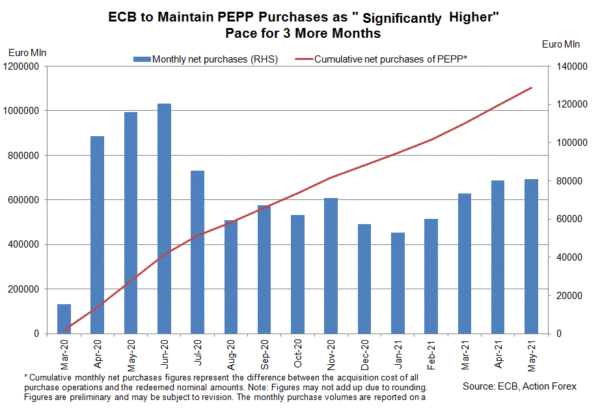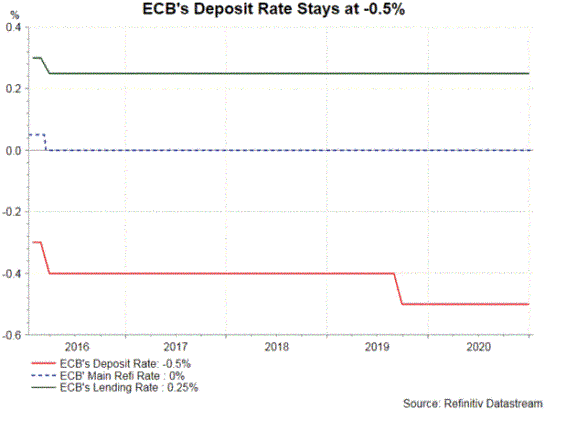The focus of this week’s ECB meeting is the outlook of PEPP purchases in the second half of the year. Although the Eurozone’s economy has improved, while the vaccination progress has accelerated, since the last meeting, we expect policymakers to maintain the current pace of purchases for another 3 months. Notwithstanding the divided views among members, tightening in financial conditions, subdued underlying inflation, and the uncertain and uneven path of recovery suggest that the central bank would maintain a dovish tone. The latest economic projections will likely be revised higher from March’s, given the economic improvements.
Economic data released since the April meeting have shown signs of economic improvements. The unemployment rate slipped -0.1 ppt to 8% in April. The number of unemployed dropped -134K, following a -209K decline in March. Headline CPI accelerated to +2% y/y in May from 1.6% in April, thanks to higher energy costs. This marks the strongest since late 2018 and exceeded both ECB’s target and market consensus. The central bank had projected inflation to reach target in the last quarter of this year. However, core inflation remains subdued, edging +0.2 ppts higher to +0.9% during the month. GDP contracted -0.3% q/q in 1Q21, upwardly revised from the previous estimate of -0.6%. In 4Q20, the economy expanded +0.4% q/q.
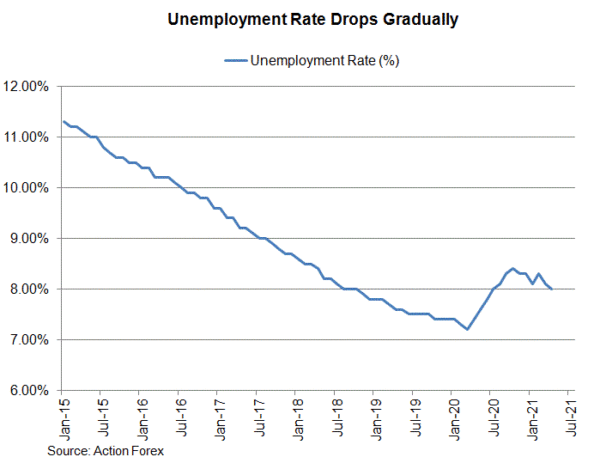
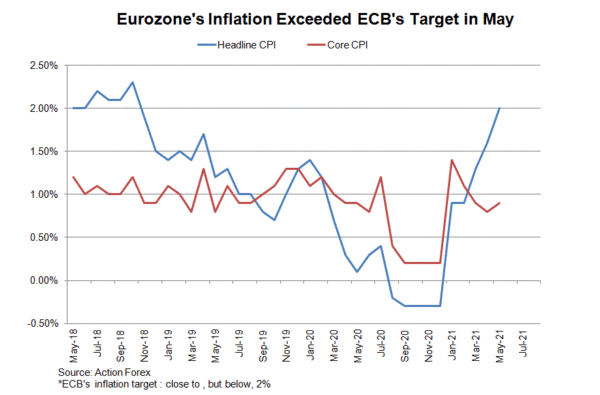 Leading indicators also point to continued recovery in May. Markit’s manufacturing PMI gained +0.2 point to 63.1, while the services PMI increased +4.7 points to 55.2, in May. Both came in stronger than expected. The composite PMI also improved to 57.1 from April’s 53.8. As suggested in the accompanying report, demand recorded the “strongest surge in demand since the start of 2018 as covid restrictions were eased and vaccine progress boosted confidence”. The recovery in the services sector was “solid” and would “likely to be sustained throughout the summer”. The outlook is encouraging as the roll-out of vaccines has gathered momentum, facilitating further reopening of the economy.
Leading indicators also point to continued recovery in May. Markit’s manufacturing PMI gained +0.2 point to 63.1, while the services PMI increased +4.7 points to 55.2, in May. Both came in stronger than expected. The composite PMI also improved to 57.1 from April’s 53.8. As suggested in the accompanying report, demand recorded the “strongest surge in demand since the start of 2018 as covid restrictions were eased and vaccine progress boosted confidence”. The recovery in the services sector was “solid” and would “likely to be sustained throughout the summer”. The outlook is encouraging as the roll-out of vaccines has gathered momentum, facilitating further reopening of the economy.
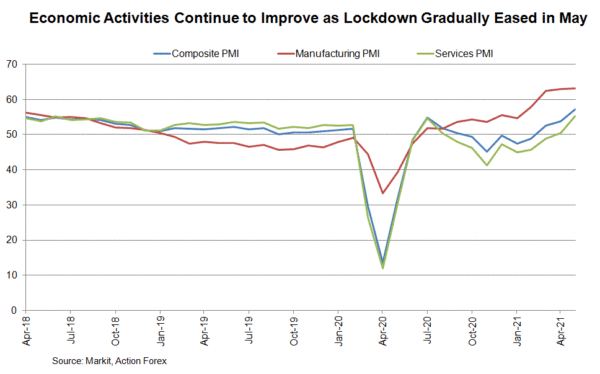
Despite the optimism, policymakers would maintain a cautious tone, suggesting uncertainty on and downside risks to the economic outlook. Financial conditions have tightened. For instance, German 10-year bund yield rose to a 1-year high of -0.11% in May before falling back to -0.22% on June 8. Moreover, while inflation expectation remains elevated, it has been softened recently. More importantly, as mentioned above, the core inflation remains subdued.
Notwithstanding the divided views on the PEPP outlook, it appears that the overall tone has tilted to the dovish side recently. Last week, President Christine Lagarde reaffirmed that “strong policy support will continue to provide a bridge over the pandemic and well into the economic recovery”. She added that “the ECB is committed to preserving favorable financing conditions throughout this period”. Board member Isabel Schnabel suggested late last month that “a premature withdrawal of either fiscal or monetary support would be a great mistake”.
The hawks of the board have, however, moderated their stance. For instance, Klaas Knot acknowledged in his recent speech that “European economy is gradually moving out of emergency phase and into recovery phase”. He added that “the likelihood of this temporary inflation translating into second-round effects and substantial wage demands – at this moment I’m not seeing any signs of it”. He believed that “shrinking ECB balance sheet will be a lengthy process”.
Concerning the monetary policy stance, the members would likely maintain the current pace of PEPP purchases. They would reiterate the stance of “significantly higher” pace than earlier in the year. We believe the current pace of about 80-890b euro /month would remain unchanged for 3 more months. Yet, the ECB would have to face the tapering issue and guide the market about slower purchases afterwards. Other monetary policy measures will stay unchanged with the Asset Purchase Program (APP) (traditional QE) at 20B euro/ month and the deposit rate at -0.5%. The members warned that risks to growth remain skewed to downside, while they forecast growth to resume in 2Q21.
